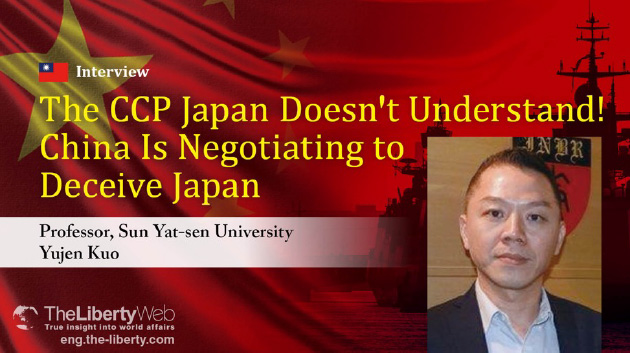China Is Negotiating to Deceive Japan
The CCP Japan Doesn't Understand!
The third of Xi Jinping’s characteristics is “cunning deception”. A Taiwanese expert on the Chinese Communist Party’s modus operandi and Japanese politics talked about its deception techniques.
Professor, Sun Yat-sen University
Yujen Kuo

(profile)
Professor Kuo specializes in Northeast Asian regional security issues, Japan-U.S. relations and military alliances, and Japan’s defense policy and defense industry. He received his PhD. in Political Science from the University of Southern California, USA. He was a visiting research fellow at the Institute of Social Science, University of Tokyo, secretary general to the Taiwan Society of Japan Studies, and an executive officer at the Center for Japanese Studies, National Sun Yat-sen University before assuming his current position.
The latest example of the CCP’s deception is still the Coronavirus. Around November 2019, a rumor came to Taiwan that a new pneumonia was spreading in mainland China. When Taiwanese researchers field-investigated to Wuhan, they were told by the local officials that the disease is not contagious to humans and the situation was under control.
However, the researchers were suspicious about the briefing and reported to the Taiwanese government that the Chinese authorities might be lying, and the government swiftly decided to restrict entry from mainland China. Thanks to this, the Corona infection was controlled.
Along with the U.S. and major democracies in the world, the Taiwanese government also suspects that the Coronavirus might be an artificial one. As Taiwan has been seriously threatened by China in many different fields, the island has a very strong sense of crisis when dealing with China
For example, Taiwan suffers 30 million cyber-attacks annually from China (compared to averagely 1 to 2 million in European countries). Also, there have been lots of structural business fraud or deception cases from the more than a million Taiwanese businessmen working at China.
The Taiwanese government, on the other hand, has assigned officials in dealing with Chinese threats in every ministry, and has established a report and case database in a whole-government approach.
Never Negotiate With CCP
If there are people in Japan still believe Japan could resolve the territorial dispute with China through talks, they are being too naive. This is because the Japanese government has been trapped by the CCP to date.
By deliberately creating trouble, the CCP has been able to force its opponent to the negotiating table to buying time for further preparation, and once an agreement is reached, CCP will not be loyal and carry out more provocative actions regardless.
For example, the Senkaku issue emerged in 2007, and at the Japan-China summit in May 2018, the two governments agreed to setup a hotline (*) and other measures to resolve the issue, and the Japanese government was relieved. However, even after that, China accelerated its violations of territorial waters and airspace near the Senkaku.
In 2018, the two countries signed the Agreement of Air and Maritime Communication Mechanism in order to improve Sino-Japanese relations and avoid collisions in the air and sea. However, Japan’s intentions were easily ignored, and in February 2021, China enacted the Coast Guard Act, which allows China Coast Guard to use weapons when necessary. The trick here is that the 2018 agreement did not include any provisions on the coast guard vessels from both sides.
KMT Was Tricked Into Losing the Mainland
As such, CCP originally had no intention of abiding by the agreement and created loopholes during negotiations in advance to give CCP an advantage.
In the past, Chiang Kai-shek, the late leader of the Chinese Nationalist Party, KMT, also fell into CCP’s negotiation trap during civil war and eventually had to flee to Taiwan. His son, the late President Chiang Ching-kuo, learned the lesson and maintained the “Three Noes Policy” : “No contact,” “No negotiation,” and “No compromise.”
What the Japanese government needs to do is to revise domestic laws such as those regulating foreign investment in order to prevent the CCP from penetrating Japan. For example, it should strengthen the capital screening process for land acquisition, merge and acquisition at high technology. In addition, the specific attack patterns of the CCP should be systematically collected and organized, and the Japanese society should be educated through the media. These two measures are critically lacking in Japan.
In diplomacy, the Japanese government must expand the values of respect for freedom, democracy, and human rights, and build “walls” in democratic countries. It is also important to share information about the CCP and to cooperate and respond quickly to any problems that may arise.



















